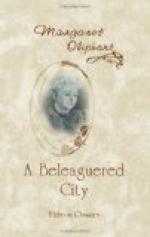‘M. le Maire has seen a——what there is outside?’ Riou cried, stammering in his excitement; and the other fixed upon me eyes which were hungering with eagerness—if, indeed, it is permitted to use such words.
‘I have seen—nothing, Riou,’ I said.
They looked at me with the utmost wonder. ’M. le Maire has seen—nothing?’ said Riou. ’Ah, I see! you say so to spare us. We have proved ourselves cowards; but if you will pardon me, M. le Maire, you, too, re-entered precipitately—you too! There are facts which may appal the bravest—but I implore you to tell us what you have seen.’
‘I have seen nothing,’ I said. As I spoke, my natural calm composure returned, my heart resumed its usual tranquil beating. ’There is nothing to be seen—it is dark, and one can perceive the line of the road for but a little way—that is all. There is nothing to be seen——’
They looked at me, startled and incredulous. They did not know what to think. How could they refuse to believe me, sitting there calmly raising my eyes to them, making my statement with what they felt to be an air of perfect truth? But, then, how account for the precipitate return which they had already noted, the supposed faint, the pallor of my looks? They did not know what to think.
And here, let me remark, as in my conduct throughout these remarkable events, may be seen the benefit, the high advantage, of truth. Had not this been the truth, I could not have borne the searching of their looks. But it was true. There was nothing—nothing to be seen; in one sense, this was the thing of all others which overwhelmed my mind. But why insist upon these matters of detail to unenlightened men? There was nothing, and I had seen nothing. What I said was the truth.




